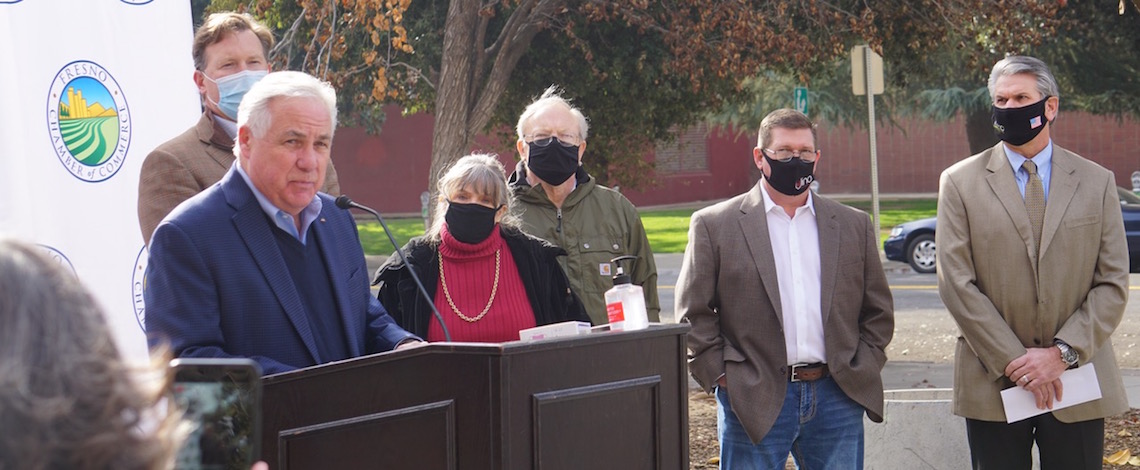
Assemblymember Jim Patterson speaks during a protest in Downtown Fresno on Friday morning. Photo by Edward Smith
Written by Edward Smith
Business owners, advocates and politicians gathered today to ask government officials for data to justify actions limiting small business activities — especially restaurants and dining.
“Our businesses in our community deserve a fact-based, data-driven, consistent approach to Covid-19 related actions,” said Nathan Ahle, president of the Fresno Chamber of Commerce, at the rally in front of the Hugh M. Burns State Building in Downtown Fresno.
Ahle said government decisions to close down small businesses have been with a “one-size fits all” approach. He and others called on the government to provide localized data that specifically addresses the impact outdoor dining has on infection rates.
Assemblymember Jim Patterson (R-Fresno) and state Sen. Andreas Borgeas (R-Fresno) were present at the event along with Chuck Van Fleet, owner of Vino Grille and Spirits and president of the Fresno Chapter of California Restaurant Association, and Greg Newman, president of the Clovis Chamber of Commerce.
A study was conducted by Stanford University in November that predicted coronavirus outbreaks using cell phone data of 98 million Americans in ten of the country’s largest metropolitan areas.
The study named restaurants as “superspreader” sites. Ahle and others declined to comment on the study, saying they did not want to address a specific study.
The study did specifically name indoor dining and used computer models to predict infection rates based on data between March and May.
Ahle said that data have not been localized to region.
“If you’re going to tell someone as the state of California that you need to close your business because you’re business is causing the spread of Covid-19, there needs to be data to back that up,” Ahle said. “The data has yet to be shown that sitting outside on a patio causes these problems.”
California Health Secretary Mark Ghaly in a public address this week said that the ban on outdoor dining was done as an effort to discourage people from leaving home.
President of the Fresno Chapter of the California Restaurant Association Van Fleet said that he gets calls everyday from restaurants on the brink. He said between 30% to 40% of restaurants could close by December. Nationally, 110,000 restaurants have already closed.
“The current regional or tier system is devastating to our Fresno County restaurants,” Van Fleet said. “Think about the restaurants you go to and imagine losing three or four of your favorites by the end of the year. Now figure out how much sales tax will be eliminated and how many people will be unemployed because of this.”
On Tuesday, a judge in Los Angeles County ruled against the decision to ban outdoor dining, calling it “arbitrary.” Los Angeles Superior Court Judge James C. Chalfant told the county to return with more evidence, said Sharokina Shams, vice president of public affairs with the California Restaurant Association. Attorneys representing the County then returned to court and the judge then ruled in favor of restaurants.
The order from Gov. Gavin Newsom, however, supersedes that court ruling and outdoor dining is still banned in L.A. County.
Van Fleet said that while outdoor dining would help, restaurants need to be operating at at least 50% of their allowed capacity in order to survive.
Borgeas said that small businesses need support. He talked about Senate Bill 74, which he co-authored with Sen. Anna Caballero (D-Salinas). The bill would make available $2.6 billion in grants for small business. $2.6 billion would be 10% of California’s projected surplus. Borgeas said the bill now has 25 signatures in support.








